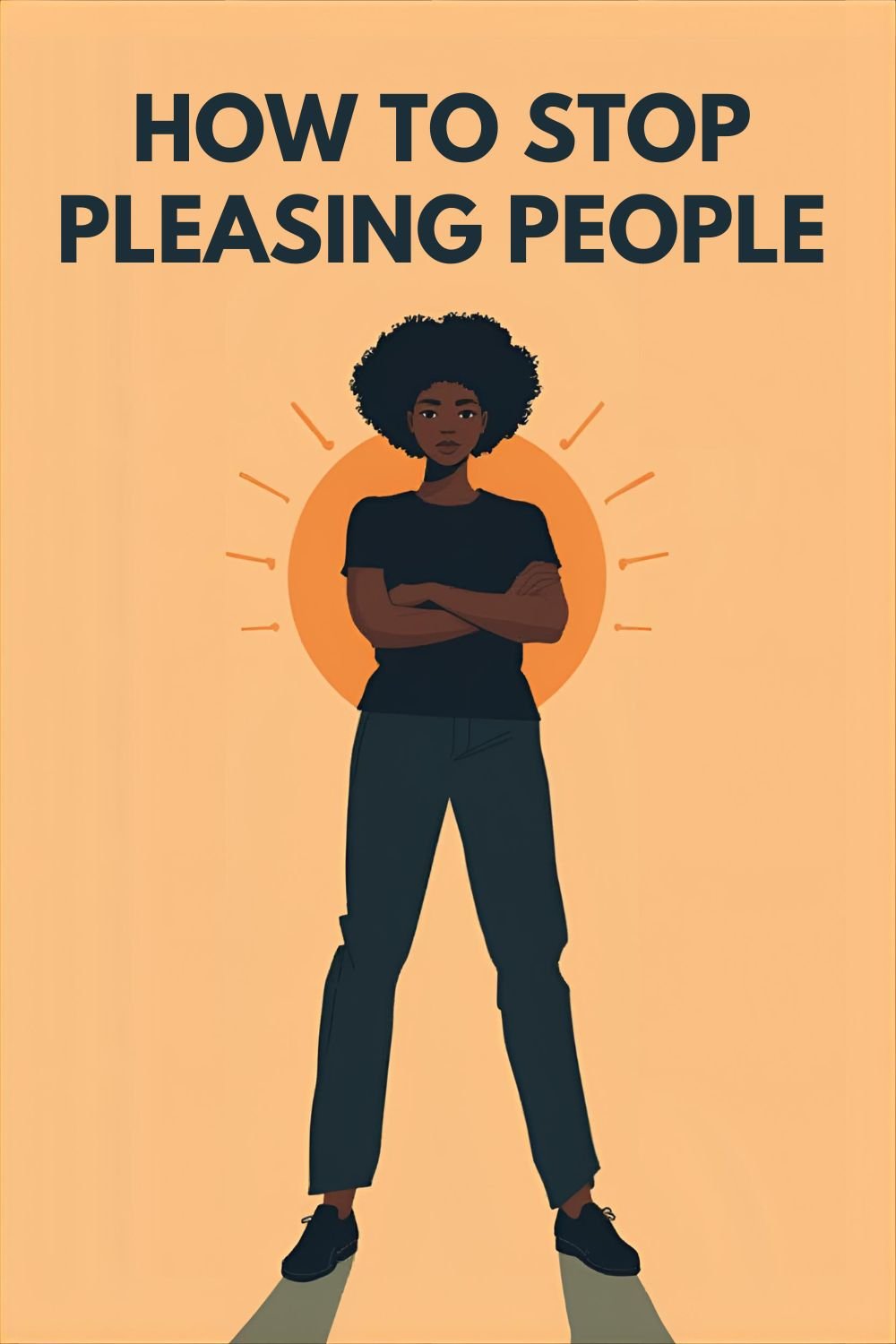Disclaimer: This post may contain affiliate links, meaning we get a small commission if you make a purchase through our link at no extra cost to you. For more information, please visit our Disclaimer Page.
At some point, you get tired of shrinking yourself just to make everyone else comfortable.
You start to wonder who you are outside of their opinions. That’s when learning how to stop pleasing people becomes necessary.
It’s not about becoming cold or selfish. It’s about recognizing the cost of constantly saying yes when your heart is screaming no.
When you spend your life chasing approval, you end up losing your own voice. If you’re not careful, pleasing people can take a toll on you and drain the life out of you. It chips away at your confidence, identity, and even your joy.
The truth is, learning how to stop being a people pleaser isn’t about becoming rude or mean. It’s about rediscovering who you really are when you’re not living for others’ approval.
Let’s walk through how you can recognize it, understand why it happens, and finally break free.
Table of Contents
What Does People Pleasing Really Mean?
People pleasing goes far beyond kindness. It’s a survival strategy that puts others’ perceived needs above your own, usually to your detriment.
Many people pleasers learned this behavior in childhood. When love or safety was conditional — when approval came from being compliant, excelling, or staying quiet — you internalized a dangerous lie: “I need to earn love by being good.”
This psychological conditioning teaches that love is transactional. In trauma research, this is called the fawn response, a term first introduced by therapist Pete Walker as the fourth trauma reaction alongside fight, flight, and freeze.
Fawning is the compulsion to appease perceived threats by pleasing others to maintain safety. Recent findings confirm that people pleasing often develops from trauma or insecure attachment, especially in individuals who have experienced emotional neglect or mistreatment.
This habit becomes a lifelong pattern of keeping others comfortable at your own expense.
Am I a People Pleaser? Signs to Watch For
You might be wondering if you’re caught in this cycle. Here are some common signs:
- You struggle to say no, even when you’re exhausted or overwhelmed
- You feel responsible for other people’s emotions and happiness
- You avoid conflict at all costs, even when it means sacrificing your needs
- You apologize constantly, even when you haven’t done anything problematic
- You change your opinions or personality depending on who you’re with
- You feel resentment building up but never express it
- You feel anxious when someone seems upset with you
- You agree to things immediately without checking in with yourself first
If these sound familiar, you’re not alone. Understanding the pattern is the first step toward change.
Why Can’t I Stop Being a Pushover? Understanding the Roots
Fear-Driven Behavior
At its core, people pleasing is ruled by fear:
Fear of rejection – equating disagreement with disconnection.
Fear of conflict – avoiding being disliked or judged.
Fear of loss – believing love or security will vanish with noncompliance.
Each “yes” to avoid discomfort reinforces this survival loop. Your brain chemistry supports it: the neurotransmitters dopamine and oxytocin reward social approval. Social acceptance activates the brain’s reward center similarly to pleasure stimuli like food or praise.
This reward feedback strengthens dependency on external validation. It undercuts your ability to trust your own judgment.
The Comparison Trap That Feeds People Pleasing
Part of what keeps you trapped in people pleasing is constantly measuring yourself against others. Research on social comparison shows that this habit damages your mental health and reinforces approval-seeking behavior.
When you’re always looking at what others are doing, achieving, or becoming, you lose sight of your own path. You start making decisions based on what looks good to others rather than what feels right for you.
This is especially true on social media. A study published in JMIR Mental Health found that social comparison on social media significantly increases anxiety, depression, and low self-esteem. The constant exposure to curated versions of other people’s lives creates a feedback loop of inadequacy.
You see someone else’s success and think, “I need to be like that to be valued.” So you say yes to things you don’t want. You take on projects that drain you. You mold yourself into what you think others want to see.
The antidote? Learning to stop comparing yourself to everybody else. When you stop measuring your worth by external standards, you create space to discover what you actually value.
The Social Programming Factor
Research shows that early educational pressures, especially for girls, reinforce obedience over autonomy. This socialization can suppress independent thought and assertiveness in adulthood.
You weren’t born a people pleaser. You learned it as a way to stay safe, accepted, or loved. That conditioning runs deep, but it can be unlearned.
The Spiritual Perspective: Overcoming the Fear of Man
Some faith leaders identify this as the biblical “fear of man” — valuing people’s approval above God’s. Proverbs 29:25 says, “The fear of man brings a snare, but whoever trusts in the Lord shall be safe.”
When approval becomes your idol, you lose the capacity to hear divine guidance. You live enslaved to human opinion instead of finding freedom in your spiritual identity.
The Apostle Paul framed it clearly in Galatians 1:10: “If I were still trying to please man, I would not be a servant of Christ.”
Pastor Steven Furtick delivers a powerful message on overcoming the curse of comparing yourself to others and living for God’s approval instead. This sermon addresses how comparison keeps you trapped in performance mode, always trying to measure up instead of resting in your identity.
Similarly, religious leaders like Mufti Abdur-Rahman ibn Yusuf have spoken about the spiritual dangers of comparison and how it leads to discontentment and loss of peace.
To live life to the fullest means serving others out of love, not fear. It means your worth is defined vertically (from God), so the opinions of people lose their grip.

My Story: I Used to Be That Person
For years, my identity revolved around keeping other people comfortable. I said yes to everything, avoided conflict, and made decisions based on what would make others happy.
I thought that made me a good person — agreeable, kind, easy to be around. In truth, it made me disappear.
I wasn’t kind. I was compliant. I wasn’t peaceful. I was silent. I wasn’t liked. I was used.
From mid-high school through early college, I mistook being liked for being valuable. I believed blending in meant belonging. The more I tried to please everyone, the more I faded.
My opinions shrank. My dreams went quiet. I learned to stay small just to keep the peace.
When I did speak up or dream out loud, I was met with judgment or laughter. Instead of questioning them, I questioned myself. I stopped trying.
I buried every part of me that wanted to stand out because I feared being disliked.
That mindset came at a cost. People valued me only for my willingness to bend. They didn’t appreciate my kindness — they counted on my inability to say no.
The more I gave, the more they took. The less I recognized myself.
Eventually, I realized that loving others shouldn’t mean abandoning myself. My mental health, my peace, and my sanity matter as much as anyone else’s comfort.
I couldn’t keep everyone happy without losing myself completely.
Letting go of that habit wasn’t easy. It meant losing people who only valued me when I stayed quiet. It meant disappointing those who expected my compliance.
But it was worth it. For the first time, I felt free.
Now I make choices that honor me. I speak honestly, even when it’s uncomfortable. I say no when something threatens my peace.
I protect my boundaries because they aren’t barriers. They’re proof that I finally respect myself.
Why Comparing Ourselves to Others Keeps Us Stuck
According to research on why comparing ourselves is unhealthy, this habit creates a mental prison. You’re always looking outside yourself for validation instead of building internal confidence.
The comparison mindset fuels people pleasing because you’re constantly adjusting your behavior based on what you think will make you measure up. You see someone more accomplished, more liked, or more successful, and you think, “Maybe if I do what they want, I’ll be valued too.”
But here’s the truth: comparison divides. Research shows it creates “envy up” (feeling inferior to those above you) and “scorn down” (feeling superior to those below you). A study on division by comparison found that this pattern destroys genuine connection and breeds resentment.
When you’re caught in comparison, you can’t form authentic relationships. You’re too busy performing, measuring, and adjusting to be yourself.
The Resentment Buildup
Here’s what nobody tells you about extreme people pleasing: it breeds resentment. You start feeling bitter toward the very people you’re trying to serve.
You blame them for taking advantage of you. But the truth is harder to swallow: you taught them how to treat you.
Every time you said yes when you meant no, you reinforced the pattern. Every boundary you didn’t set gave them permission to cross the line.
This isn’t about shame. It’s about awareness. You can’t change what you don’t acknowledge.
How to Stop People Pleasing Behavior: Practical Strategies
Build Foundational Assertiveness Skills
Assertiveness is the ability to express your thoughts and needs confidently while respecting others. It sits at the center of mental well-being.
Behaviorist Joseph Wolpe first identified assertiveness as a therapeutic counteraction to anxiety. His model proposed that “one cannot be simultaneously anxious and assertive.”
Think of it this way:
- Passive communicators yield power to others out of fear
- Aggressive communicators impose power over others through hostility
- Assertive communicators hold power with others — respect mutually maintained
You’re not choosing between being a doormat and being mean. There’s a middle path that honors both you and others.
Stop the Comparison, Start the Healing
One of the most practical ways to stop people pleasing is to stop comparing yourself to others. Mental health expert Healthline offers guidance on how they learned to stop comparing and found peace in their own journey.
The article points out that comparison is a learned behavior. Just as you learned to people please, you learned to compare. And you can unlearn both.
Here are practical tips from 5 ways to stop comparing yourself to other people:
- Notice when you’re doing it – Awareness is the first step. When you catch yourself comparing, pause and redirect your thoughts.
- Practice gratitude for your own journey – Instead of focusing on what others have, appreciate what you’ve accomplished.
- Limit social media exposure – If Instagram or Facebook triggers comparison spirals, take breaks or unfollow accounts that make you feel inadequate.
- Celebrate others genuinely – When you’re secure in yourself, you can cheer for others without feeling threatened.
- Focus on your own growth – Measure yourself against who you were yesterday, not against someone else today.
The Power of Delay
When someone asks for your time, money, or help, practice these scripts:
- “Let me check my schedule and get back to you.”
- “I have to think about it.”
- “I need some time before I can give you an answer.”
Delaying your response breaks impulsive guilt-based compliance. It activates your prefrontal cortex — your brain’s rational control center.
This simple pause gives you space to ask yourself: “Do I genuinely want to do this, or am I just afraid to say no?”
Essential Communication Techniques
Based on Manuel J. Smith’s 1975 book When I Say No, I Feel Guilty, here are five classic techniques:
I-Statements: “I feel overwhelmed when commitments pile up. I need downtime.”
Broken Record: Politely repeat your boundary: “No, I can’t volunteer this time.”
Fogging: Agree with limited truth — “You’re right, I have been busy” — then restate your stance.
Negative Inquiry: “Can you clarify what you mean by ‘unhelpful’?” This disarms critics.
Negative Assertion: Acknowledge a mistake without surrendering control — “Yes, I forgot that. I’ll fix it.”
These techniques calm confrontation and reinforce boundaries without aggression.
How to Manage People Pleasing: Setting Boundaries That Stick
What Are Boundaries?
Boundaries are the invisible fences that define how you allow others to treat you. They’re not walls meant to keep people out. They’re standards meant to keep respect in.
According to leadership expert Carey Nieuwhof, setting them requires redefining what “nice” means: honor both your needs and others’ freedom.
Steps for Building Boundaries
1. Reframe the narrative: Boundaries are not selfish — they’re acts of stewardship over your mental health and energy.
2. Recognize red flags: Resentment signals overstepping. If you feel bitter after helping someone, you probably said yes when you should have said no.
3. Expect backlash: People accustomed to your compliance may test limits. They’ll call you selfish, cold, or changed. That’s their discomfort, not your problem.
4. Communicate concisely: “That doesn’t work for me” is enough. You don’t owe anyone a 10-minute explanation for protecting your peace.
5. Act consistently: Follow through if a boundary is ignored. Boundaries without consequences are just suggestions.
Boundary Scripts You Can Use Today
- “I appreciate you thinking of me, but I can’t take that on right now.”
- “I’m not available for that.”
- “That doesn’t work for me, but I hope you find someone who can help.”
- “I’ve thought about it, and my answer is no.”
- “I need to prioritize my own commitments first.”
These aren’t rude. They’re respectful. Both to the other person and to yourself.
If you’re learning how to stop living in fear of disappointing others, these scripts become your training wheels.
Dealing With Post-Boundary Guilt
Guilt after boundary-setting is normal at first. Why? Because your nervous system interprets making others unhappy as danger.
This anxiety stems from early conditioning. Disapproval equaled punishment. The solution is retraining both your thoughts and your body to understand that saying “no” is not harm — it’s health.
Regulation strategies:
Externalize emotions: Write down your guilt as evidence, not identity. “I feel guilty” is different from “I am guilty.”
Accept discomfort: Unlearning survival habits is awkward but temporary. The discomfort of growth is better than the pain of staying stuck.
Practice self-compassion: Research on self-compassion shows that forgiving your mistakes activates resilience and emotional healing.
You’re not doing anything objectionable by protecting your peace. You’re learning to respect yourself the way you’ve always respected others.
Daily Exercises for Self-Validation
1. The “Why” Journal
Before saying “yes,” ask: “Am I doing this from love, fear, or guilt?” Self-inquiry exposes manipulation patterns.
If you’re doing it out of fear (they’ll be mad) or guilt (I owe them), say no. If you’re doing it out of genuine love with no strings attached, say yes.
2. Value Yourself First
Do kind things for yourself. Clean your home. Cook your favorite food. Practice comfort not as display but as devotion.
When you treat yourself with care, you teach your nervous system that you’re worth caring for.
3. The Energy Check
Before commitments, ask: “Does this energize or drain me?” Let your body’s signals decide.
Your body knows before your mind does. Listen to it.
4. Mirror Practice
Each morning, stand tall and rehearse:
- “No, thank you.”
- “That doesn’t work for me.”
- “I need time to think about it.”
Repetition rewires your reflexes. You’re training your mouth to match your mind.
5. Prioritize Self-Care
Nutrition, hydration, movement, and quiet rest re-establish physiological safety. Psychological self-trust grows from physical well-being.
When your body feels safe, your mind stops seeking approval as a survival strategy.
People Pleasing Personality Disorder: When to Seek Help
While people pleasing itself isn’t a clinical disorder, it can overlap with conditions like:
- Dependent Personality Disorder: an excessive need to be taken care of that leads to submissive behavior
- Avoidant Personality Disorder: extreme social anxiety and fear of rejection
- Codependency: deriving self-worth from being needed by others
If your people pleasing causes significant distress, interferes with daily functioning, or stems from unresolved trauma, consider professional support.
Therapy options that help:
- Cognitive Behavioral Therapy (CBT): teaches distress tolerance and assertive language replacement
- Dialectical Behavior Therapy (DBT): helps you balance acceptance and change through mindfulness and boundary skills
- Acceptance Commitment Therapy (ACT): focuses on values-based living and psychological flexibility
- EMDR: effective for those whose people pleasing roots in PTSD or trauma history
These approaches help you rewrite the mental scripts that keep you trapped in approval-seeking patterns.
Integrating Mind, Body, and Spirit Healing
Emotional Psychology
Understanding that approval-seeking is a trauma loop can lift shame. You’re not broken. You’re learning safer attachment strategies.
Therapy gives you tools to challenge automatic thoughts like “If I say no, they’ll leave me” and replace them with reality-based beliefs like “People who respect me will accept my boundaries.”
Physical Regulation
The chronic stress of pleasing others triggers hyper-arousal in the sympathetic nervous system. Solutions include:
- Deep diaphragmatic breathing to activate the vagus nerve and calm your fight-or-flight response
- Exercise routines to discharge tension stored in your muscles
- Grounding techniques like 5-4-3-2-1 sensory awareness to anchor present focus
When your body feels safe, your mind stops seeing every “no” as a threat.
Spiritual Grounding and Stopping Comparison
Faith-based healing reframes your value in unchanging divine identity. It freeing you from conditional love.
Many religious traditions address the problem of comparison and approval-seeking. Various sermons about comparing ourselves to others teach that your worth comes from divine creation, not human opinion.
The message of overcoming the curse of comparing reminds believers that God doesn’t compare you to anyone else. You’re uniquely created and valued.
Reflect daily on truths like:
- “I am loved without performance” (Romans 8:38-39)
- “I will no longer serve two masters — approval and authenticity”
- “My worth is not negotiable”
When you root your identity in something bigger than human opinion, rejection loses its power.
Resources for Your Journey: Books That Transform
If you’re serious about stopping people pleasing and comparison, these books offer life-changing wisdom:
Stop Comparing Yourself
Comparisonitis by Melissa Ambrosini – This book tackles how to stop comparing yourself to others and be genuine. Ambrosini breaks down the psychology of comparison and offers practical tools for building authentic confidence.
The Gifts of Imperfection by Brené Brown – Brown’s research on shame and vulnerability explains why comparing ourselves damages our sense of worthiness. She teaches how to accept yourself as you are.
Emotional Freedom by Judith Orloff – Dr. Orloff provides strategies for how to stop comparing yourself to others and find emotional liberation. Her approach combines psychology and spirituality.
The Book of Joy by the Dalai Lama and Desmond Tutu – This conversation between two spiritual leaders offers wisdom on finding joy beyond comparison. They discuss how comparison robs you of peace.
Stop Comparing Yourself: The Essential Guide – This practical book teaches how to stop caring what other people think and become confident in yourself. It’s filled with exercises and mindset shifts.
Additional Wisdom
For a practical perspective from someone who’s walked this path, OnlyMyHealth shares how they learned to stop comparing themselves to others through conscious daily practice.
These resources aren’t just theory. They’re tools for transformation when you’re ready to do the work.
The Unapologetic You: Moving Forward
Learning how to stop being a people pleaser is among life’s bravest transformations. It requires courage to choose authenticity over applause.
When you release the burden of constant approval, you find peace — spiritual, emotional, and neurological. Life stops being a stage performance and becomes a sanctuary.
Remember these truths every day:
- You are not responsible for everyone else’s happiness
- Your worth is not negotiable
- Disagreement does not equal rejection
- Boundaries are not barriers — they’re respect
- You don’t need to compare yourself to anyone
Start small: practice pausing before saying yes, breathe deeply, and forgive yourself when you stumble. Progress is made through awareness, not perfection.
Your Action Plan
Here’s how to begin today:
- Identify one relationship where you consistently overextend yourself
- Set one small boundary this week (example: “I can’t take that call right now”)
- Journal your feelings before and after setting the boundary
- Notice when you compare yourself to others and redirect your thoughts
- Celebrate the discomfort — it means you’re growing
- Repeat daily until boundaries feel natural instead of terrifying
You don’t have to do this alone. If this journey stirs deep anxiety, consider reaching out for support. Therapy, coaching, or faith-based counseling can provide the guidance you need.
You deserve to take up space in your own life. You deserve relationships built on mutual respect, not one-sided compliance.
You deserve peace. Not the fragile peace of pleasing everyone, but the lasting peace that comes from finally pleasing yourself.
When you know your worth, you stop negotiating it. When you’re proud of yourself, you stop seeking validation from others. When you’re learning how to let go and trust God, you find freedom from human approval.
The journey starts now. Take the first step. Your future self is waiting.






